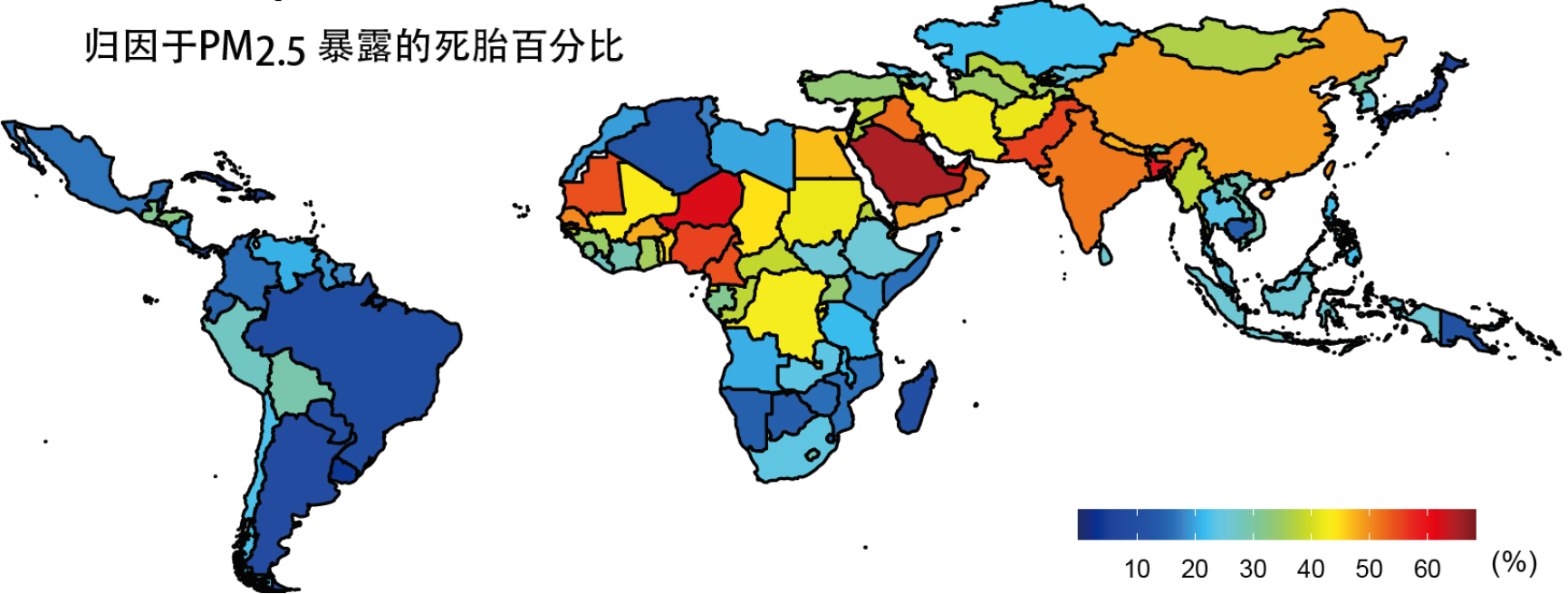妊娠失败(包括流产和死胎)会影响母亲的生理与心理健康、对家庭以及社会造成广泛的间接损失,但却是一个没有受到足够重视的公共卫生问题,联合国儿童基金会报告将其称之为“被忽视的悲剧”。为了预防妊娠失败,传统干预措施包括改善产前相关的医疗服务和孕妇营养、却较少涉及孕期的不良环境暴露。然而,大气污染等环境暴露往往普遍存在,因其影响全部人群而具有较大的公共卫生危害。对于生育健康,大气污染暴露可能是“被忽视的风险”。
早在2011年,北京大学朱彤、任爱国、邱兴华合作研究团队在人类胎盘样本中检出多环芳烃等有机污染物,并发现其可能导致神经管畸形,研究成果发表于PNAS。神经管畸形等出生缺陷是导致妊娠失败的重要病因,多环芳烃也是大气细颗粒污染(PM2.5)中的有害成分,因此,朱彤和薛涛提出了PM2.5暴露诱发流产和死胎的假设,并利用全球人群数据开展系统研究,在中国、美国、南亚、非洲均发现了PM2.5暴露与妊娠失败之间存在显著正相关,成果发表于Ecotoxicology and Environmental Safety (2021), International Journal of Epidemiology (2022), Lancet Planetary Health (2019, 2021).
在此基础上,薛涛和朱彤团队进一步整合多源数据,构建PM2.5与死胎的暴露反应关系,首次在全球尺度估算了相关疾病负担,研究成果于2022年11月29日,在线刊发于Nature Communications (doi.org/10.1038/s41467-022-34250-4)。该研究涉及包括中国在内的137国家、覆盖超过98%的全球死胎病例,具有全球代表性。研究估算全球39.7%的死胎可归因于孕期PM2.5暴露,即便考虑了估计不确定性、基于95%置信下限,这个比例仍然超过四分之一。

据该研究估算,在中国,每年约6.4万死胎可归因于PM2.5暴露。朱彤表示,我国从2013年起在治理PM2.5污染方面取得了巨大成就,对于改善我国妇幼健康、保障人口生育力具有重要促进作用。然而,我国当期施行的空气质量标准并未充分考虑孕妇和儿童等脆弱人群,因而在未来的空气质量标准修订中应当强调对易感人群的保护。坚持污染减排不放松、力争早日达到碳中和是从环境健康角度保护孕妇和胎儿的根本措施。
系列研究的主要作者包括环境科学与工程学院教授、中国科学院院士朱彤,公共卫生学院、教育部生育健康重点实验室研究员薛涛,公共卫生学院研究生佟明坤、王慧煜。研究得到国家自然科学基金、能源基金会和空气-气候-健康(AiR-Climate-Health, ARCH)研究平台的支持。
发表论文:
Xue, T., Tong, M., et al., Zhu, T. 2022. Estimation of stillbirths attributable to ambient fine particles in 137 countries. Nature Communications. https://doi.org/10.1038/s41467-022-34250-4
参考文献:
Ren, A., et al. Zhu, T. 2011. Association of selected persistent organic pollutants in the placenta with the risk of neural tube defects. Proceedings of the National Academy of Sciences. https://doi.org/10.1073/pnas.1105209108
Xue, T., Zhu, T. et al. 2019. Association between pregnancy loss and ambient PM2.5 using survey data in Africa: a longitudinal case-control study, 1998–2016. The Lancet Planetary Health. https://doi.org/10.1016/s2542-5196(19)30047-6
Wang, H., et al. Xue, T. 2021. Association of maternal exposure to ambient particulate pollution with incident spontaneous pregnancy loss. Ecotoxicology and Environmental Safety. https://doi.org/10.1016/j.ecoenv.2021.112653
Xue, T., et al. Zhu, T. 2021. Estimation of pregnancy losses attributable to exposure to ambient fine particles in south Asia: an epidemiological case-control study. The Lancet Planetary Health. https://doi.org/10.1016/s2542-5196(20)30268-0
Tong, M., et al., Xue, T. 2022. Time-varying association between fetal death and gestational exposure to ambient fine particles: a nationwide epidemiological study of 49 million fetuses in the contiguous US from 1989 to 2004. International Journal of Epidemiology. https://doi.org/10.1093/ije/dyac103
